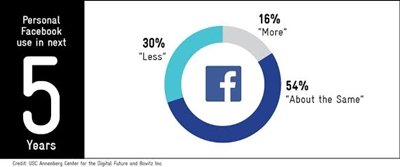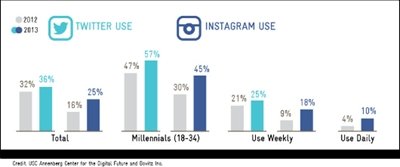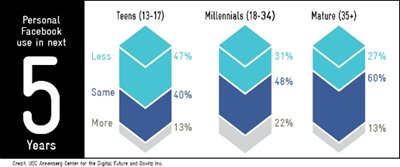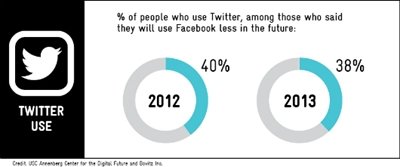In the wake of Facebook confirming last fall that the number of young teens who use the site has declined, a newly-released survey shows that overall use of the world’s most popular social media may also be declining.
The survey, conducted by the USC Annenberg Center for the Digital Future and Bovitz, Inc., found that almost one-third of all Facebook users will use the service less within five years.
In addition, the survey also found that current use of Twitter and Instagram is growing rapidly.
“The growth of Twitter and Instagram show that users are eager to get their voices out there in a quick and engaging way,” said Jeffrey Cole, director of the Center for the Digital Future.
“Social media users – teens and Millennials especially – are craving to be heard,” Cole said. “Microblogs like Twitter, Instagram, and Tumblr are becoming the most powerful way to deliver their messages. It’s all about having a highly visible personal presence online that can be communicated quickly – if anyone is listening.”
The new findings reinforce two predictions by Cole about the erosion in the use of mass-market social media sites by young audiences: In 2005, Cole predicted that the young user base at MySpace would decline – “MySpace lost its ‘cool factor’ when young users saw that their older siblings and parents had begun using it,” said Cole.
In 2010, Cole said that Facebook would continue to grow overall for at least five years, while at the same time, lose some of its appeal to young audiences.
“Facebook won’t collapse as a social platform as MySpace did; it now has more than one billion users, and should reach at least 1.5 billion users – a phenomenal number – with especially strong growth in developing countries,” Cole said.
"Facebook paid $1 billion for Instagram and unsuccessfully offered $3 billion for Snapchat," said Cole. "If Facebook wants to maintain its dominance among teenagers, it will have to continue to open its checkbook and write multi-billion dollar checks."
Instead of being the primary social media site for trendsetters, Cole said, “Facebook will become the phone directory for the planet. Young users will to go to Facebook as the place where they communicate with their families, and as the site where they search for someone. Then users will move that relationship to a smaller online community, such as a microblog.”
Overall Facebook use
The survey found that 30 percent of Facebook users said they will be using Facebook less or a lot less in five years.
“While many users say they will use Facebook less, the service will continue to be a primary communications tool for large numbers of users,” said Greg Bovitz, president of Bovitz, Inc. and a senior fellow at the Center for the Digital Future.
“We anticipate that Facebook will continue to serve as an ‘online watering hole’ – a place where users can coordinate their communications, stay in touch with friends and groups, create events, and build a comprehensive personal online presence – in a way that microblogs currently can’t,” Bovitz said.
Instagram and Twitter growth
The survey found that number of Instagram and Twitter users is growing dramatically – especially among Millennials.

Millennials and non-Millennials
Significant percentages of Millennials and non-Millennials alike said they will be using Facebook less in five years.

Increased Twitter use as Facebook use declines
Of those who said they will use Facebook less, almost 40 percent now use Twitter.

Survey background
The findings were developed from research produced by the Center for the Digital Future and Bovitz, Inc. that covers issues such as privacy, social media use, use of technology at school, stress and technology, and norms regarding the presence of technology in social settings. The Topical Survey, an online consumer panel, has a margin of error of +/- 3.1% and was conducted in fall 2013.
The Center for the Digital Future
Since 2000, the Center for the Digital Future has examined the behavior and views of a national sample of Internet users and non-users in major annual surveys of the impact of the Internet on America. The center also created and organizes the World Internet Project, which includes similar research with 37 international partners.
Bovitz, Inc.
Bovitz, Inc. (bovitzinc.com) is a design-driven research and strategy firm that drives innovation and helps organizations develop opportunity.









